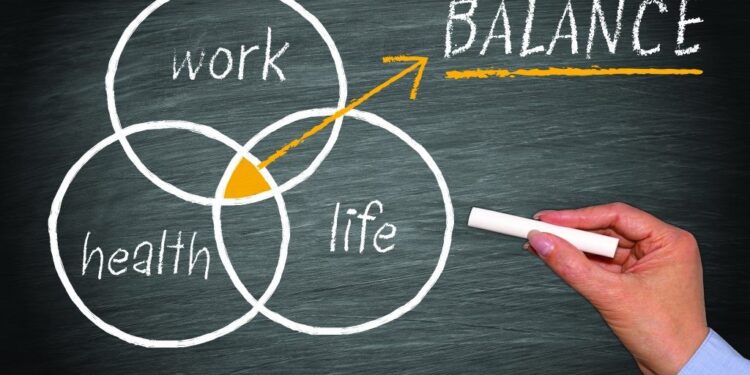In today’s fast-paced world, finding a healthy work-life balance can feel like an impossible task. With the demands of work, family, and personal commitments, it’s easy to neglect your physical and mental well-being. However, maintaining a balanced life is essential for long-term health, happiness, and productivity. This blog explores the importance of work-life balance, its impact on health, and practical strategies to achieve harmony between your professional and personal life.
Understanding Work-Life Balance and Its Importance: Work-life balance refers to the equilibrium between the time and energy spent on work and the time devoted to personal, social, and recreational activities. This balance is critical for maintaining physical health, emotional well-being, and professional success. This blog will explain why it’s vital to prioritize both your career and personal life and how neglecting one can lead to burnout, stress, and health issues. We’ll explore the benefits of achieving work-life balance, such as improved mental clarity, stronger relationships, and greater job satisfaction.
The Connection Between Work-Life Balance and Health: Stress is a major consequence of poor work-life balance, and it can have significant effects on your physical and mental health. Chronic stress is linked to a range of health problems, including high blood pressure, heart disease, digestive issues, anxiety, and depression. In this section, we’ll delve into how work-related stressors affect the body and mind, and how a lack of balance can lead to burnout. We’ll also explore how striking a balance between work and life helps reduce stress, enhance immune function, and promote better sleep, leading to a healthier, happier you.
The Impact of Work-Life Imbalance on Mental Health: Excessive work demands and neglecting personal needs can have a profound impact on mental health. The feeling of being overwhelmed, isolated, or disconnected from family and friends can increase feelings of anxiety and depression. This blog will examine how an imbalance between work and life can affect mental well-being and offer strategies for improving mental health. We’ll discuss the importance of self-care, stress management techniques, and setting boundaries to create space for relaxation and personal fulfillment.
Practical Tips for Achieving Work-Life Balance: Finding a balance between work and life isn’t always easy, but it is possible with the right strategies. This blog will offer actionable tips to help you manage your time and energy effectively:
- Set Clear Boundaries: Learn to establish clear boundaries between work and personal life, such as avoiding checking work emails outside of office hours or taking regular breaks throughout the day.
- Prioritize Tasks: Identify what’s most important and focus on those tasks first. Learn how to delegate or eliminate less important tasks to avoid feeling overwhelmed.
- Time Management: Discover techniques like time-blocking and the Pomodoro method to manage your workday efficiently, allowing more time for personal activities.
- Learn to Say No: Saying no to extra work or social obligations when you’re feeling stretched thin is essential for maintaining balance.
- Practice Mindfulness and Relaxation: Incorporate mindfulness practices, yoga, or deep breathing into your daily routine to help reduce stress and improve mental clarity.
The Role of Physical Activity in Work-Life Balance: Exercise is a powerful tool for maintaining work-life balance, as it improves both physical and mental health. Regular physical activity can increase energy levels, boost mood, and reduce stress, making it easier to juggle professional and personal responsibilities. This section will highlight how integrating exercise into your daily routine, even in small ways like walking during lunch breaks or taking the stairs, can improve work-life harmony.
Work-Life Balance for Parents and Caregivers: For parents and caregivers, achieving work-life balance can be especially challenging. Balancing career demands with family responsibilities requires careful planning and support. This blog will provide tips for parents and caregivers, including how to build a strong support network, communicate effectively with family and colleagues, and make time for self-care.
The Importance of Taking Time Off: Taking regular breaks and vacations is essential for maintaining work-life balance. Time away from work allows you to recharge, prevent burnout, and gain perspective. In this section, we’ll discuss the benefits of taking time off, whether it’s a weekend getaway or a longer vacation, and how to ensure you truly disconnect from work during these breaks.
Building a Sustainable Work-Life Balance: Work-life balance isn’t a one-time achievement; it’s an ongoing process that requires consistent effort and adjustment. This blog will offer advice on how to continually assess your work-life balance and make changes when necessary. We’ll emphasize the importance of setting long-term goals, staying flexible, and regularly checking in with yourself to ensure that both work and personal life are aligned with your values.
Achieving work-life balance is essential for overall well-being and success in both personal and professional life. With practical advice, real-world examples, and tips to help you navigate the challenges of balancing career and personal commitments, this blog will empower you to take control of your health, happiness, and future.












